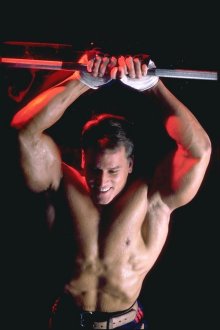Home Page
The latest articles, features and news.


All About...


Sponsored Links


Discussion Forums




Pecker Provisions


Condoms, lubes, pumps, stretchers, exercises, supplements, sports underwear and more.

Firefly Talks Dicks


Words of feminine wisdom about men's problems.

|
| | |
|

7 May 2004
TV Ads With Muscular Actors Make Men Depressed
by George Atkinson  Television images of muscular, bare-chested men lifting weights and endorsing products like deodorants leave men feeling depressed and unhappy with their muscularity, which may lead to steroid abuse and unhealthy, extreme exercising, University of Central Florida researchers say.
Television images of muscular, bare-chested men lifting weights and endorsing products like deodorants leave men feeling depressed and unhappy with their muscularity, which may lead to steroid abuse and unhealthy, extreme exercising, University of Central Florida researchers say. While a number of studies have shown how images of thin, beautiful models affect women's self-esteem, UCF professor Stacey Tantleff-Dunn and graduate student Daniel Agliata are among the first to examine how "a culture of muscularity" affects the well-being and self-esteem of men. Boys are exposed to the culture at an early age, when they play with muscular action figures, Tantleff-Dunn said. "The level of muscularity and attractiveness that are idealized in the media often are not attainable for the average man," Tantleff-Dunn said. "Men see more of a discrepancy between how they want to look, or think they need to look, and the image they see in the mirror. Such discrepancies can cause the dissatisfaction and low self-esteem that lead to extreme and often unhealthy actions, such as eating disorders, exercising too much and steroid abuse." The study involved 160 UCF students, who were divided into two groups for the study. Both groups watched an old game show episode, but they saw different, modern commercials during the game show. One group saw ads that featured primarily muscular, young and bare-chested men in commercials advertising products such as deodorant and cologne. Another group saw ads for financial, telephone and automobile companies that mainly featured men aged 30 and older wearing business or casual clothes at home or in a business setting. Students who saw ads with muscular, bare-chested men reported feeling more depressed and less satisfied with their muscles, while the other students reported feeling much less depressed after watching the show. More studies are needed to show how the "culture of muscularity" affects the moods, dieting and workout habits of men, the researchers said. Tantleff-Dunn said she and Agliata are developing a better way to measure how men perceive their bodies. Previous studies on body image have focused on body parts such as the thighs and buttocks that are more of a concern to women than men, she said. "The key will be to help people develop realistic expectations about their appearance, as well as the appearance of others, and avoid buying into ideals that are impossible or unhealthy to attain," Tantleff-Dunn said.
|
|